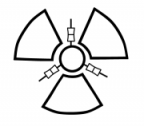radmon.org testing new server!
10 years 10 months ago #914
by mw0uzo
Replied by mw0uzo on topic radmon.org testing new server!
Collection in person only.
Please Log in or Create an account to join the conversation.
10 years 9 months ago - 10 years 9 months ago #939
by mw0uzo
Replied by mw0uzo on topic radmon.org testing new server!
So here is the server that will power radmon.org and some other things too:
http://www.supermicro.co.uk/products/system/1U/6016/SYS-6016T-NTF.cfm
I have modified it to not sound like a jet engine, the PSU fan ground was moved to 3.3V to reduce noise and the 4 pin PWM fans were modified with a 3.3V zener in the supply lead to reduce spin rate. I tried a few resistors, but they did not allow enough range for the motherboard to control the fan. With the zeners, the fans are quiet and can also spin up to a fast rate when the server is hot.
Current spec is 160Gb HD and 24Gb RAM, dual Xeon E5530. 16 logical cores, 8 physical cores.
Here is my plan for it:
1) Fill with a bank of hybrid HDs. Four drives, RAID. Expand as funds allow in the future.
2) Simple basic install of Ubuntu 14.04 server, running OpenSSH and Vitualisation servers - done
3) radmon.org will be a virtual server, 4 cores and 4Gb RAM. Rebuilding the radmon.org server to iron out any kinks in the current system. This is underway but will take some time before its ready.
4) One test server, 1 core and 1Gb RAM - done.
5) Offer some VPS for low monthy cost?
What do people think? Should I be running radmon.org in a VM? I can allocate mem, cores and storage as required. Perhaps it should be run on the main system, then other virtual servers allocated as required? That would avoid any performance penalty of the VM. Should I be using LVM? Inside the VMs or outside? So many questions...
I am very interested to see howquickly the graphs etc will be generated on the new system.
http://www.supermicro.co.uk/products/system/1U/6016/SYS-6016T-NTF.cfm
I have modified it to not sound like a jet engine, the PSU fan ground was moved to 3.3V to reduce noise and the 4 pin PWM fans were modified with a 3.3V zener in the supply lead to reduce spin rate. I tried a few resistors, but they did not allow enough range for the motherboard to control the fan. With the zeners, the fans are quiet and can also spin up to a fast rate when the server is hot.
Current spec is 160Gb HD and 24Gb RAM, dual Xeon E5530. 16 logical cores, 8 physical cores.
Here is my plan for it:
1) Fill with a bank of hybrid HDs. Four drives, RAID. Expand as funds allow in the future.
2) Simple basic install of Ubuntu 14.04 server, running OpenSSH and Vitualisation servers - done
3) radmon.org will be a virtual server, 4 cores and 4Gb RAM. Rebuilding the radmon.org server to iron out any kinks in the current system. This is underway but will take some time before its ready.
4) One test server, 1 core and 1Gb RAM - done.
5) Offer some VPS for low monthy cost?
What do people think? Should I be running radmon.org in a VM? I can allocate mem, cores and storage as required. Perhaps it should be run on the main system, then other virtual servers allocated as required? That would avoid any performance penalty of the VM. Should I be using LVM? Inside the VMs or outside? So many questions...
I am very interested to see howquickly the graphs etc will be generated on the new system.
Last edit: 10 years 9 months ago by mw0uzo.
Please Log in or Create an account to join the conversation.
- ThibmoRozier
-

- Offline
- Elite Member
-

10 years 9 months ago - 10 years 9 months ago #940
by ThibmoRozier
Replied by ThibmoRozier on topic radmon.org testing new server!
Hey Dan. 
Having VM's make it way easier to backup the systems as it is just your VHD files and the VM files.
Also, if you create VM's you can set them up as template VM's and rapidly deploy a fresh, new machine.
Also, having the host running with half of it's resources, you have plenty of resources left to properly run a firewall etc.
For the VPS... Maybe running an off-site log server service is an interesting field? You just have to keep their data for 3 years and it's mainly not that much data.
Oh, and LVM... Better use that in the guest systems, not the host.
It'd be better to use a normal partitioning with ReiserFS for the host system, that would offer a better performance for host systems whereas LVM with Ext4 offers a better performance for the guest systems.
That is purely based on my own experience, though.
Could just be that I made a mistake somewhere, but it's all I can share on that.
Also, ReiserFS can handle huge partitions and data files, also a benefit.
Having VM's make it way easier to backup the systems as it is just your VHD files and the VM files.
Also, if you create VM's you can set them up as template VM's and rapidly deploy a fresh, new machine.
Also, having the host running with half of it's resources, you have plenty of resources left to properly run a firewall etc.
For the VPS... Maybe running an off-site log server service is an interesting field? You just have to keep their data for 3 years and it's mainly not that much data.
Oh, and LVM... Better use that in the guest systems, not the host.
It'd be better to use a normal partitioning with ReiserFS for the host system, that would offer a better performance for host systems whereas LVM with Ext4 offers a better performance for the guest systems.
That is purely based on my own experience, though.
Could just be that I made a mistake somewhere, but it's all I can share on that.
Also, ReiserFS can handle huge partitions and data files, also a benefit.
Last edit: 10 years 9 months ago by ThibmoRozier.
Please Log in or Create an account to join the conversation.
- GandalfDerGraue
-

- Offline
- New Member
-

Less
More
- Posts: 9
- Thank you received: 2
10 years 9 months ago #941
by GandalfDerGraue
Replied by GandalfDerGraue on topic radmon.org testing new server!
Hey Dan,
having read the evil word "ReiserFS": Please - do yourself a favour and DON'T use Reiserfs any more - it always was a nightmare when ReiserFS did loose file entries or just corrupted files (which it did indeed, and - yes: I did manage about 30-40 servers that time!).
Filesystems that currently are most stable:
1) XFS where you have one of the most comprehensive toolchains for. XFS still my favourite, even if much distributions now prefer EXT4 since XFS was not developed by the community but SGI in the early days. But for example you can do quick filesystem checks with the filesystem online, defragmentation can be done online and so on.
2) EXT4 as successor of EXT2 - it still has Pro's and Con's in speed depending on the usage scenario but overall speed is OK and it is very stable. I'd say as stable as XFS, the toolchain for managing it is also quite OK.
Just my 5 cents
Cheers,
Wolfgang
having read the evil word "ReiserFS": Please - do yourself a favour and DON'T use Reiserfs any more - it always was a nightmare when ReiserFS did loose file entries or just corrupted files (which it did indeed, and - yes: I did manage about 30-40 servers that time!).
Filesystems that currently are most stable:
1) XFS where you have one of the most comprehensive toolchains for. XFS still my favourite, even if much distributions now prefer EXT4 since XFS was not developed by the community but SGI in the early days. But for example you can do quick filesystem checks with the filesystem online, defragmentation can be done online and so on.
2) EXT4 as successor of EXT2 - it still has Pro's and Con's in speed depending on the usage scenario but overall speed is OK and it is very stable. I'd say as stable as XFS, the toolchain for managing it is also quite OK.
Just my 5 cents
Cheers,
Wolfgang
Please Log in or Create an account to join the conversation.
- ThibmoRozier
-

- Offline
- Elite Member
-

10 years 9 months ago #942
by ThibmoRozier
Replied by ThibmoRozier on topic radmon.org testing new server!
Wolfgang is true about that, yet they had a recent update on that with Reiser.
Though most Linux systems don't require a real defragmentation, long live Inode tables.
Though I thought about it...
Maybe BtrFS is an idea?
http://en.wikipedia.org/wiki/Btrfs (Sorry for that link, it's the only one giving a proper summarized info about it.)
But if you were to go for known-stable filesystems, go for EXT4, indeed.
Though most Linux systems don't require a real defragmentation, long live Inode tables.
Though I thought about it...
Maybe BtrFS is an idea?
http://en.wikipedia.org/wiki/Btrfs (Sorry for that link, it's the only one giving a proper summarized info about it.)
But if you were to go for known-stable filesystems, go for EXT4, indeed.
Please Log in or Create an account to join the conversation.
- GandalfDerGraue
-

- Offline
- New Member
-

Less
More
- Posts: 9
- Thank you received: 2
10 years 9 months ago #943
by GandalfDerGraue
Replied by GandalfDerGraue on topic radmon.org testing new server!
Hi Thimo,
the funny thing is: "Chris Mason, the principal Btrfs author" (from wiki) was one of the major developers for ReiserFS besides Hans Reiser up to the time when 1) Hans was sent to jail and SuSE/ Novell decided to let almost 50% of their people go. And - yes, from given informations BtrFS seems to be a good choice. Even if I have to say
1) not all features of BtrFS are seen being completely stable, some of the features may not be enabled at all up to now
2) I can not tell anything on the filesystem BtrFS from daily usage aspect, as up to now I still don't use it. And I never have seen it up to now in daily usage on a server as well.
cheers,
Wolfgang
the funny thing is: "Chris Mason, the principal Btrfs author" (from wiki) was one of the major developers for ReiserFS besides Hans Reiser up to the time when 1) Hans was sent to jail and SuSE/ Novell decided to let almost 50% of their people go. And - yes, from given informations BtrFS seems to be a good choice. Even if I have to say
1) not all features of BtrFS are seen being completely stable, some of the features may not be enabled at all up to now
2) I can not tell anything on the filesystem BtrFS from daily usage aspect, as up to now I still don't use it. And I never have seen it up to now in daily usage on a server as well.
cheers,
Wolfgang
Please Log in or Create an account to join the conversation.
Moderators: Gamma-Man
Time to create page: 0.239 seconds

